Burmese, or Myanmar, is a member of the Lolo-Burmese branch of the Sino-Tibetan language family. It is spoken mainly in Myanmar (Burma), where it is the official language. In 2007 there were about 33 million people who spoke Burmese as a first language. There are also thought to be another 10 million who speak it as a second language.
Standard Burmese is spoken in the Irrawaddy River valley. Within that area there are minor differences in vocabulary and pronunciation between the Mandalay dialect of Upper Burma and the Yangon dialect of Lower Burma. Burmese dialects in other parts of Burma differ more from the standard, but they are all more or less mutually intelligible.
There are two registers of Burmese: high and low. The high register is used in formal literature, newspapers, radio and formal speeches. The low register is used in television, comics, informal literature, and everyday conversation. Since the 1960s some Burmese writers have promoted the use of the low register, and have suggest the abandoning of the high register.
The name Myanmar (မြန်မာ [mjəmà]) is the high register name for the country, and Burma (ဗမာ [bəmà]) is the low register name. Both names derive from the Bamar people (ဗမာလူမျိုး [bəmà lùmjó]), the largest ethnic group in Burma. The full official name of the country is the "Republic of the Union of Myanmar" (ပြည်ထောင်စုသမ္မတ မြန်မာနိုင်ငံတော် [pjìdàʊɴzṵ θàɴməda̰ mjəmà nàɪɴŋàɴdɔ̀]).
The Burmese or Myanmar script developed from the Mon script, which was adapted from a southern Indian script during the 8th century. The earliest known inscriptions in the Burmese script date from the 11th century.
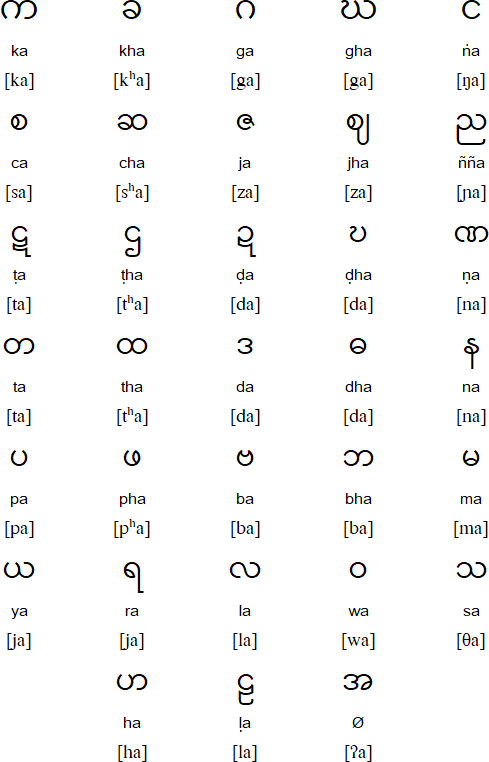
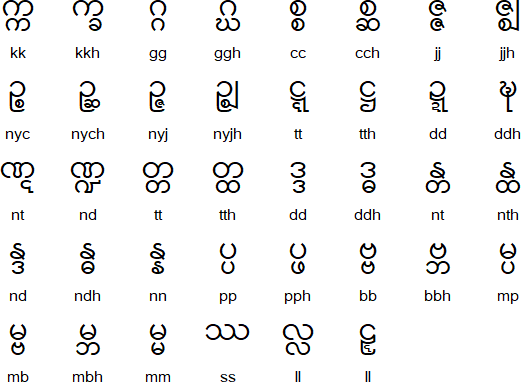
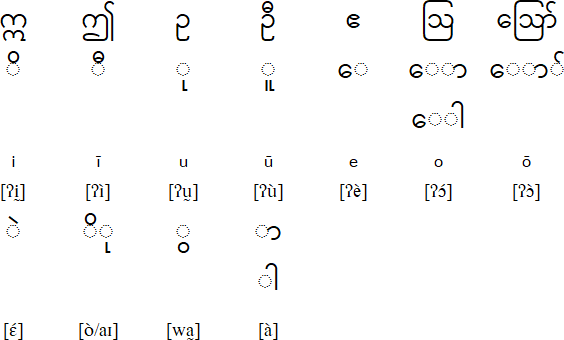
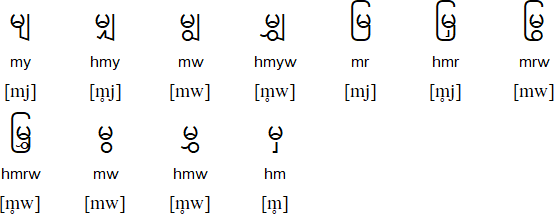
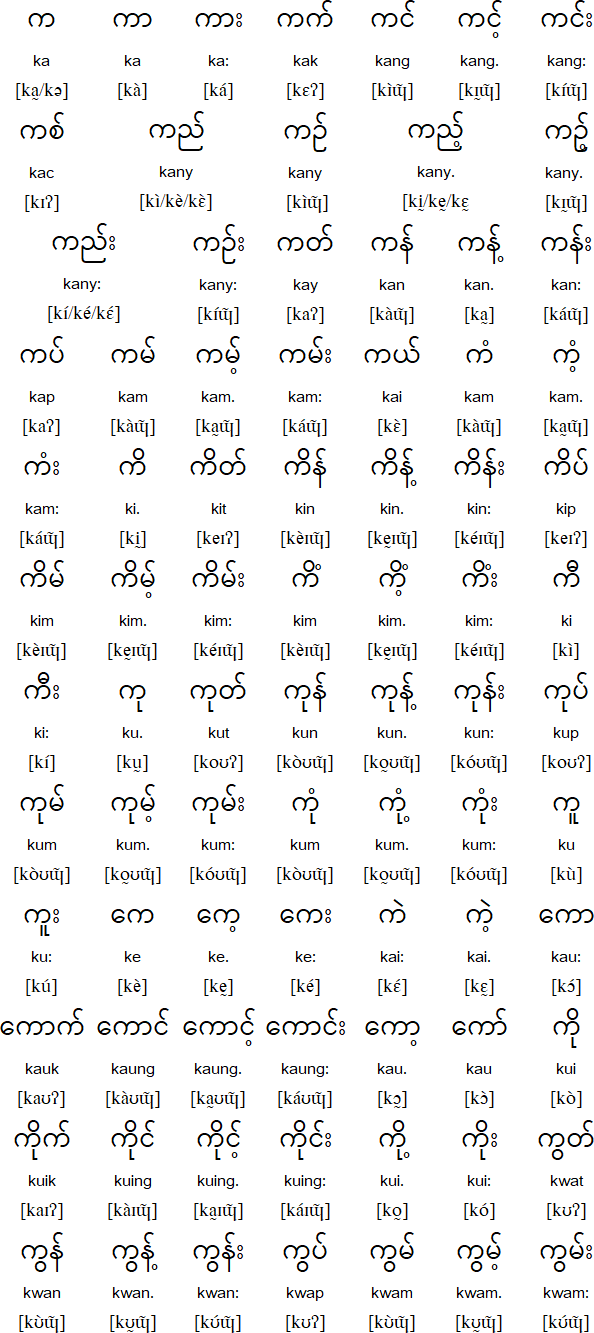

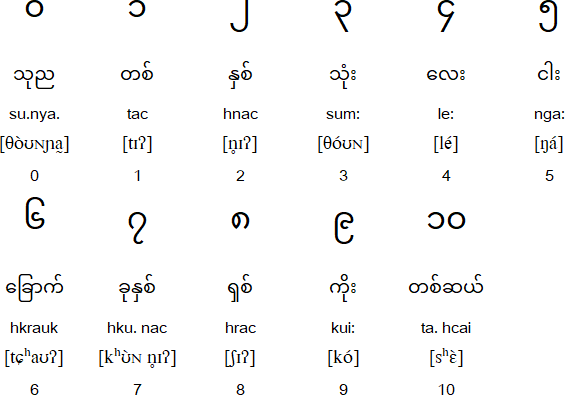

Hear a recording of this text by Lynnie T. Htoo
lutuing:sany tu-nyi lwatlapsau: gun.sikhka.hprang. lany:kaung:, tu-nyi-lwatlapsau: ahkwang.-are:mya:hprang. lany:kaung:, mwe:hpwa:la.su-mya: hpracsany. htuisutui.hnai puing:hkra: wehpantatsau: nyanhnang. kyang.wat si.tatsau: cittui.hri.kra.rwe htuisutui.sany ahkyang:hkyang: mettahta:rwe hcakhcamkyang.sum:sang.e.
lù.dáɪ̯ɴ.ðè tù.ɲì lʊʔ.laʔ.θɔ́ go̰ʊ̯ɴ.ðeɪ̯ʔ.kʰa̰.pʰjɪ̰ɴ lé.gáʊ̯ɴ | tù.ɲì lʊʔ.laʔ.θɔ́ ʔə.kʰwɪ̰ɴ.ʔə.jé.mjá.pʰjɪ̰ɴ lé.gáʊ̯ɴ | mwé.pʰwá.la̰.ðù.mjá pʰjɪʔ.θè || tʰò.ðù.do̰-n̥aɪ̯ʔ páɪ̯ɴ.ʨʰá wè.pʰàɴ.taʔ.θɔ́ ɲàɴ.n̥ɪ̰ɴ ʨɪ̰ɴ.wʊʔ θḭ.daʔ.θɔ́ seɪ̯ʔ.to̰.ʃḭ.ʥa̰-ɥḛ tʰò.ðù.do̰.ðè ʔə.ʨʰɪ́ɴ.ʥɪ́ɴ meʔ.ta̰.dá-ɥḛ sʰeʔ.sʰàɴ.ʥɪ̰ɴ.ðóʊ̯ɴ.ðɪ̰ɴ-ḭ
Transliteration and transcription by Otavio
All human beings are born free and equal in dignity and rights. They are endowed with reason and conscience and should act towards one another in a spirit of brotherhood.
(Article 1 of the Universal Declaration of Human Rights)
Information about Burmese | Phrases | Numbers | Tower of Babel | Burmese courses on: Amazon.com and Amazon.co.uk [affilate links]
Information about the Burmese language
http://en.wikipedia.org/wiki/Burmese_alphabet
Online Burmese lessons
http://www.seasite.niu.edu/Burmese/
http://www.youtube.com/user/BurmeseLanguage
Burmese phrases
http://ilanguages.org/burmese_phrases.php
http://www.asiapearltravels.com/language/lesson28.php
http://wikitravel.org/en/Burmese_phrasebook
http://seap.einaudi.cornell.edu/system/files/Burmese Language Phrases with Audio_0.pdf
http://www.asianhorizons.co.uk/tours-of-burma-phrases-burmese/
http://www.englishspeak.com/my/english-lessons.cfm
Online Burmese dictionaries
https://www.myordbok.com
https://www.burmese-dictionary.org/
https://www.myanmar-dictionary.org/
http://sealang.net/burmese/
http://www.lexilogos.com/english/burmese_dictionary.htm
Free Burmese fonts
http://www.seasite.niu.edu/seasite.htm
http://www.wazu.jp/gallery/Fonts_Myanmar.html
http://www.angelfire.com/country/burmesefont/
Online Burmese radio
http://www.voanews.com/burmese/
http://www.bbc.co.uk/burmese/
http://www.rfa.org/burmese/
https://soundcloud.com/dvbradio
Online Burmese news
http://www.dnevnik.bg
http://www.voanews.com/burmese/
http://www.bbc.co.uk/burmese/
http://www.rfa.org/burmese/
Aiton, Akha, Arakanese, Burmese, Eastern Pwo Karen, Jingpho, Khamti, Marma, Pali, Palaung, Pa'O, S'gaw Karen, Tai Laing, Tai Phake, Western Pwo
Achang, Akha, Bisu, Burmese/Myanmar, Hani, Lahu, Lashi, Lipo, Lisu, Lolopo, Marma, Nisu, Nusu, Nuosu, Sani, Zaiwa
Aiton, Akha, Arakanese, Burmese, Eastern Pwo Karen, Jingpho, Khamti, Marma, Pali, Palaung, Pa'O, S'gaw Karen, Tai Laing, Tai Phake, Western Pwo
Ahom, Aima, Arleng, Badagu, Badlit, Basahan, Balinese, Balti-A, Balti-B, Batak, Baybayin, Bengali, Bhaiksuki, Bhujimol, Bilang-bilang, Bima, Blackfoot, Brahmi, Buhid, Burmese, Carrier, Chakma, Cham, Cree, Dehong Dai, Devanagari, Dham Lipi, Dhankari / Sirmauri, Ditema, Dives Akuru, Dogra, Ethiopic, Evēla Akuru, Fox, Fraser, Gond, Goykanadi, Grantha, Gujarati, Gunjala Gondi, Gupta, Gurmukhi, Halbi Lipi, Hanifi, Hanuno'o, Hočąk, Ibalnan, Incung, Inuktitut, Jaunsari Takri, Javanese, Kaithi, Kadamba, Kamarupi, Kannada, Kawi, Kharosthi, Khema, Khe Prih, Khmer, Khojki, Khom Thai, Khudabadi, Kirat Rai, Kōchi, Kodava Lipi, Komering, Kulitan, Kurukh Banna, Lai Tay (Tai Yo), Lampung, Lanna, Lao, Leke, Lepcha, Limbu, Lontara/Makasar, Lota Ende, Magar Akkha, Mahajani, Malayalam, Meitei (Modern), Manpuri (Old), Marchen, Meetei Yelhou Mayek, Meroïtic, Masarm Gondi, Modi, Mon, Mongolian Horizontal Square Script, Multani, Nandinagari, Newa, New Tai Lue, Ojibwe, Odia, Ogan, Pahawh Hmong, Pallava, Phags-pa, Purva Licchavi, Qiang / Rma, Ranjana, Rejang (Kaganga), Sasak, Savara, Satera Jontal, Shan, Sharda, Sheek Bakrii Saphaloo, Siddham, Sinhala, Sorang Sompeng, Sourashtra, Soyombo, Sukhothai, Sundanese, Syloti Nagri, Tagbanwa, Tai Noi, Takri, Tamil, Tanchangya (Ka-Pat), Tani, Thaana, Telugu, Thai, Thirke, Tibetan, Tigalari, Tikamuli, Tocharian, Tolong Siki, Vatteluttu, Warang Citi
Page last modified: 26.06.25
[top]
You can support this site by Buying Me A Coffee, and if you like what you see on this page, you can use the buttons below to share it with people you know.

If you like this site and find it useful, you can support it by making a donation via PayPal or Patreon, or by contributing in other ways. Omniglot is how I make my living.
Note: all links on this site to Amazon.com, Amazon.co.uk
and Amazon.fr
are affiliate links. This means I earn a commission if you click on any of them and buy something. So by clicking on these links you can help to support this site.
[top]